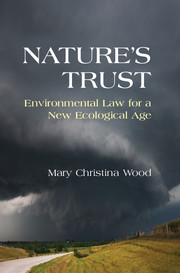Book contents
- Frontmatter
- Dedication
- Contents
- Preface
- Acknowledgments
- Part I Environmental Law: Hospice for a Dying Planet
- Part II The People’s Natural Trust
- 6 The Inalienable Attribute of Sovereignty
- 7 The Ecological Res
- 8 Fiduciary Standards of Protection and Restoration
- 9 From Bureaucrats to Trustees
- 10 Beyond Borders: Shared Ecology and the Duties of Sovereign Co-Tenant Trustees
- 11 Nature’s Justice: The Role of the Courts
- Part III The Public Trust and the Great Transition
- Notes
- Index
8 - Fiduciary Standards of Protection and Restoration
Published online by Cambridge University Press: 05 June 2014
- Frontmatter
- Dedication
- Contents
- Preface
- Acknowledgments
- Part I Environmental Law: Hospice for a Dying Planet
- Part II The People’s Natural Trust
- 6 The Inalienable Attribute of Sovereignty
- 7 The Ecological Res
- 8 Fiduciary Standards of Protection and Restoration
- 9 From Bureaucrats to Trustees
- 10 Beyond Borders: Shared Ecology and the Duties of Sovereign Co-Tenant Trustees
- 11 Nature’s Justice: The Role of the Courts
- Part III The Public Trust and the Great Transition
- Notes
- Index
Summary
If government allowed corporations to raid the Social Security Fund, American citizens would rise up in arms over the theft of “their” property. Yet under current environmental law, corporations do just that. Aided by the government, mega-corporations seize astonishing amounts of property belonging to the citizens in common. This looting creates razed forests, toxic watersheds, ocean dead zones, suburban sprawl, decapitated mountains, ocean oil geysers, vanished species, and climate crisis. While this wreaks havoc for countless citizens, it provokes only dim outcry from the public, because the political frame surrounding environmental law conceals the public property character of these resources and thus obscures the sovereign’s obligation in managing them. The political realm depicts Nature as an amorphous milieu, not really owned by anyone, that corporations can lawfully plunder with government’s blessing, bestowed through permits. Environmental law might house a den of thieves, but the public perceives no theft. By contrast, a trust framework characterizes natural assets as the public’s inherited natural wealth that, with decisive justice, should pass down through the generations of citizens. It imposes an unwavering fiduciary obligation on government trustees to safeguard the commonwealth. This chapter brings definition to that obligation.
Politics as “Reality”: The Controlling Frame of Environmental Law
Social frames influence people’s perception of reality. The current social frame legitimizes environmental oppression of human beings and their fellow species by casting resource disputes as, essentially, political contests. The only property rights recognized by this frame are private ones. When the public ends up on the losing side of the contest, the frame applauds the protection of private property rights (and, tangentially, economic interests) with little or no acknowledgment of the public property rights and human rights trammeled in the process.
- Type
- Chapter
- Information
- Nature's TrustEnvironmental Law for a New Ecological Age, pp. 165 - 187Publisher: Cambridge University PressPrint publication year: 2013



